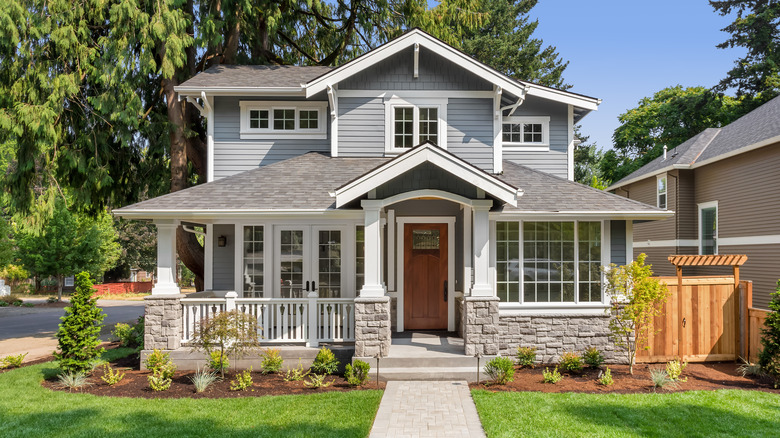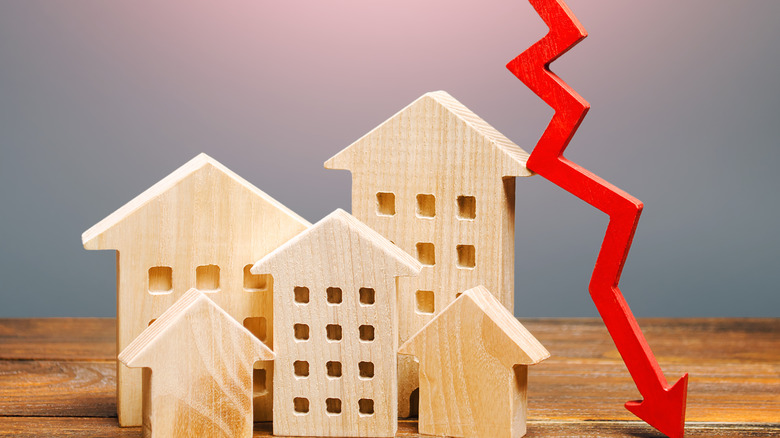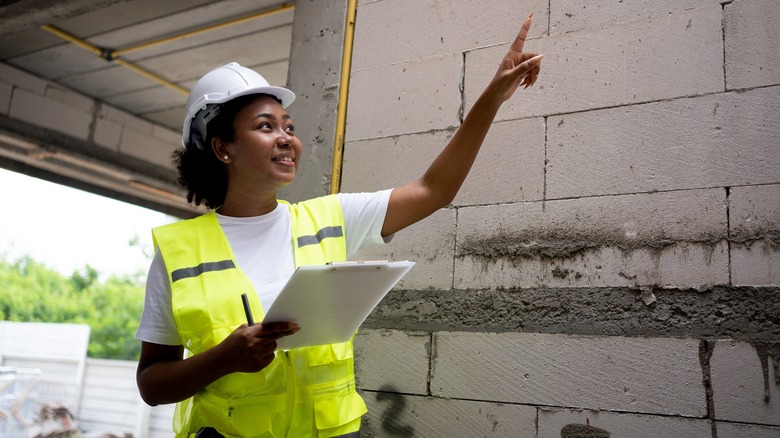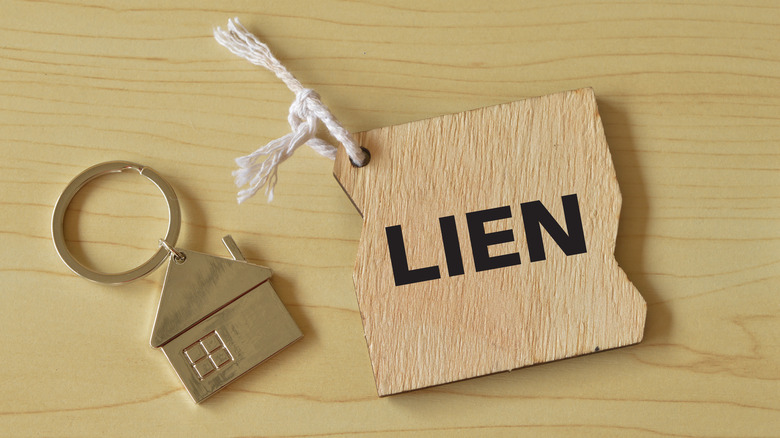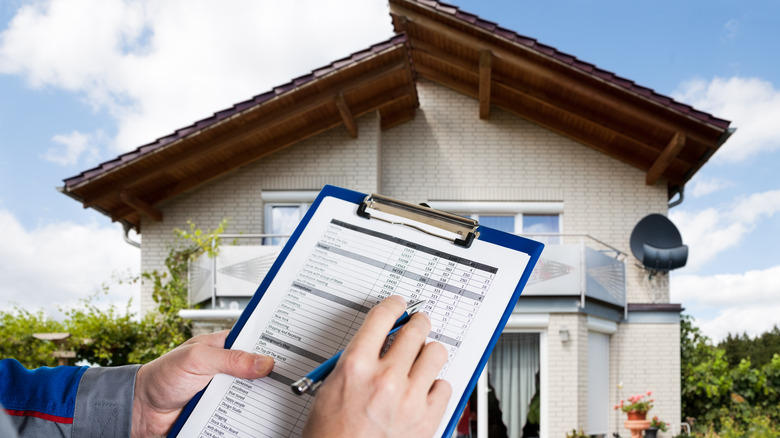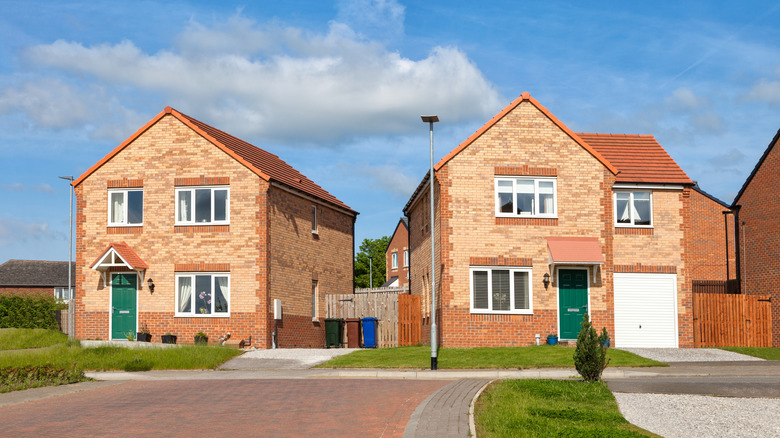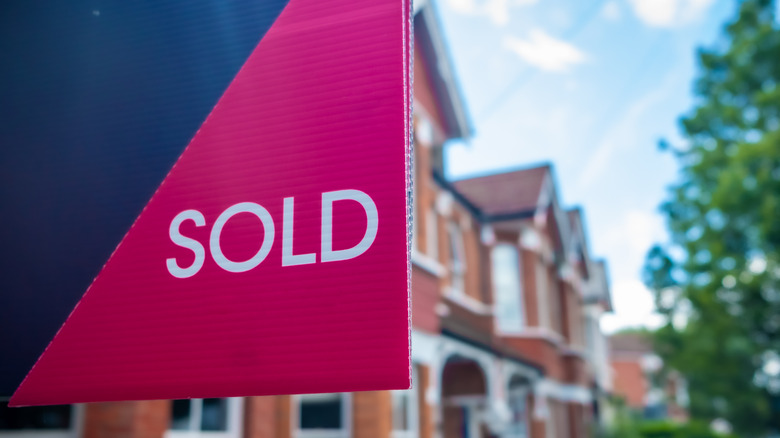Things To Know Before Buying A Foreclosed Home
When a home is foreclosed, the owner has failed to meet the terms of their repayment plan. When this happens, the mortgagor — usually a bank — will repossess the property to get back the balance owed. A foreclosure isn't a one-step process; it's a bit more complex. There are four stages to the process of repossessing a home. First, the individual defaults on their payment; this is recognized when payment is over 30 days late. At this time, the lender will issue a "default notice," highlighting what would happen if payment isn't promptly made. A lender cannot legally serve a notice of foreclosure until the homeowner has defaulted for over 120 days.
Depending on the state of residence, the lender has two options once the required 120 days have passed. In some regions, mortgagors must file for foreclosure, meaning that a suit is brought against the individual and goes to trial. If the court rules in favor of the lender, the house is repossessed and put up for sale. In other states, the lender can directly serve the individual a "notice of intent to foreclose." At this stage, buyers can purchase homes through two processes — auction or via the local sheriff's department. If you're interested in going to one of these auctions, you might wonder what are some of the pros and cons of buying a property this way. While you can get a house for much cheaper than in the real estate market, there are also quite a few risks involved. For example, while you can do a walkthrough and get an inspection when buying a house the traditional way, you don't get that option in an auction. Here are a few things to understand about the process.
You can buy via auction...
When a home is foreclosed, it will likely enter an in-person or online auction where interested parties can bid. When the auctions are done in person, there are usually several properties for sale. People gather in a large hall, as they would with many other types of live auctions, and begin to bid for their properties of interest. With an auction, it's best to go prepared, as things can get quite competitive. You want to come armed with as much information as possible. You can look up the house on Zillow or Redfin to see if there is an old listing, allowing you to see the house's interior. You also need to check if there are any liens on the property or multiple mortgages, which you can find in the county records. And don't forget a cashier's check, which you'll need to buy the property.
There are three types of auctions. "Absolute" is where the highest bid wins, even if it's $10; "minimum" is disclosed before the auction and is usually the amount owed on the property; and "reserve" is where the seller has the final say on whose bid wins. With an auction sale, you will likely get a lower house cost than you would through more traditional methods. However, a downside is you get the property as-is. This means you would be purchasing the property sight unseen. It's often unlikely that you can gain access to the house before signing on the dotted lines, so any internal and external damages would not be known until after the sale.
...Or via real estate owned property
Another way to purchase a foreclosed home is to buy from the bank. This is known as a real estate or bank-owned property. In order for a home to be referred to as an REO property, it must have first gone through the auction process and failed to sell. Because it is a less competitive route for homeowners, REO properties are a more attractive option than auctions. So how does one buy a bank-owned property? First, set your budget, and then browse through options in your price range via a number of REO-specific listings. Banks and mortgagors usually have a dedicated site for foreclosed home listings where you can browse through properties. Simply type "REO properties" into your search engine, and you'll be led to your city's or county's databases.
You can also browse through more popular property search engines, including Zillow. When searching for a new home, especially through foreclosed properties, it is advised to engage a real estate professional or property expert to talk you through the red tape and hidden clauses you might not know to look out for. As with foreclosures at auction, REO properties tend to have a lower asking price than many other properties, which makes them attractive to potential homeowners. There is also the added bonus of inspecting the home before buying. However, like with auctioned properties, REO homes are often sold as-is.
Foreclosures can be a cheaper option, but...
Yes, foreclosed properties are often cheaper than many other kinds of properties at face value. But there are reasons for that, which are worth considering for the financial bottom line. One of the main reasons foreclosed properties are priced so cheap is because the aim of the sale isn't to turn a profit. Instead, it's to get the outstanding payment on the original loan. If the mortgagor does turn a profit on the sale, they don't get to keep those earnings. Any profit the bank makes has to be turned over to the original homeowner.
However, there are some hidden costs involved when buying a foreclosed house. As mentioned above, many foreclosed properties are sold "as-is." This means that the buyer runs the risk of inheriting the home and any issues it may have. Frustratingly, you won't be able to get a ballpark figure on just how badly these repairs might set you back, so it's a bit of a dice roll.
You should always do a home inspection for REO homes
Foreclosed properties at auction do not give interested parties access to homes for inspections pre-sale. Still, REO properties tend to have different rules depending on who the real estate broker is. After registering interest and placing an offer, request some time to inspect the property thoroughly (make sure it's thorough). This is one cost that should already be in your budget when buying a foreclosed home. When conducting a home inspection on a property, there are key things to look out for. You should check the foundation, roof, and drainage system on the home's exterior. You should note any cracks, clogs, rotting materials, or excess moisture that might be symptoms of larger, more expensive structural issues.
Inside the home, you should investigate the heating, ventilation, and air-conditioning (HVAC) system for any disrepair. Amongst many other things, check for clogs in the drain, look for loose electrical lines, and be aware of leaky gas pipes. Be sure to also look out for mold and mildew, asbestos, and any pests that might be causing damage to the property. When considering how much to budget for a thorough home inspection, expect a figure between $200 to $400, depending on the size of the home, the location, and even how old the house is. This price could be considerably higher depending on these factors.
Run a title search on the property
A title search allows you to scrutinize public records for important information about the property you want to buy. If there are claims or liens — a claim placed on sizable debts that haven't been paid — on the property, a title search will show that. It will also show you the current owner and any past owners listed on the property, as well as any land restrictions.
All of these details are accessible through public archives, so you should go through the relevant records as an initial step. Remember, the reason for a title search is to avoid any nasty surprises or, worse still, surprise litigations for someone else's mistakes. It's worth diving into fully to ensure you're going into the sale with both eyes open. With that in mind, in addition to researching general public records, you should also check property tax records. For an even more thorough view of the property's history of ownership, the property deed is a great file to examine.
Conduct a home appraisal
A home appraisal is a way to evaluate a property's market value. Getting a home appraisal before purchasing a foreclosed REO property helps the potential buyer and the lender know if the loan is a worthwhile investment; the home becomes collateral. At first glance, it might look a lot like a home inspection, but the two differ significantly.
For a homebuyer to get the loan they need to purchase a property, the potential lender would require a home appraisal. On the other hand, a home inspection is not required by a lender to approve (or reject) a loan application. A home inspection is solely focused on the property in question, while an appraisal is concerned with the property and others in close proximity. A home appraisal will estimate the home's value based on the property's current conditions, as well as the value of properties nearby, coming to the conclusion that is either higher or lower than the seller's asking price. It can cost anywhere between $400 and $1,000+, depending on the home's location and accessibility.
Run a price comparison on similar properties
Short for "comparables," comps refer to houses significantly similar to the property you want to buy or sell. This is an important part of the buying process as it allows you to see what similar properties are going for. Much like appraisals, comps can give a sense of a home's value based on location, how old the property is, and what modern amenities it has.
Comps and appraisals are different but go hand in hand in ensuring that the seller sets a realistic price for their property. It also lets the buyer know not to go too high or too low on their bid to purchase. An interested buyer can either enlist the help of a real estate professional or run a price comparison on their own. If they choose to do it without professional help, there are several options for where to compare. Multiple listing sites (MLS) such as Zillow and public property records are great engines to use. The key to comps is patience. This isn't a quick comparison. As a potential buyer, you must be thoroughly aware of your potential property's price bracket. This will ensure you won't overpay.
You can also buy in pre-foreclosure ...
When a property is in pre-foreclosure, the owner has defaulted for up to 90 days. At that time, they must decide whether to pay what is owed or sell the property to pay back their lender. It is often likely that the homeowner cannot pay what they owe, forcing them to sell their home to clear the debt.
There are a few things to know when buying a house in pre-foreclosure. Typically, pre-forclosure homes aren't actually on the market, so the owner might not appreciate you knocking on their door. You can find these houses by visiting the county recorder's office and looking up recent Notice of Defaults. You can attain the address from the notice, and then approach the owner either by knocking on their door or writing them a letter to see if they're interested in selling. If they are interested, you will need to make a cash offer, so ensure you have enough capital before going this route.
... Or through the short sale process
With a short sale, the property owner reaches an agreement with their lender where a fraction of the debt is forgiven while the rest is paid off by selling the property. In this scenario, as well as pre-foreclosure, the buyer can purchase the property without going through the process of auctions or REO properties.
Purchasing a short sale could take a few weeks but, in some cases, could take an ironically long time. It could take as long as a year, starting when you registered an interest. Although the buyer can inspect the home and get it appraised before committing to the property, the lender has the final say on whether or not they wish to go ahead with the sale, and could opt to foreclose the property instead. However, a sale typically takes as little as two to three months to complete if all goes well. Remember, foreclosed homes tend to register lower on the price scale than other homes, so the demand often outweighs the supply.
